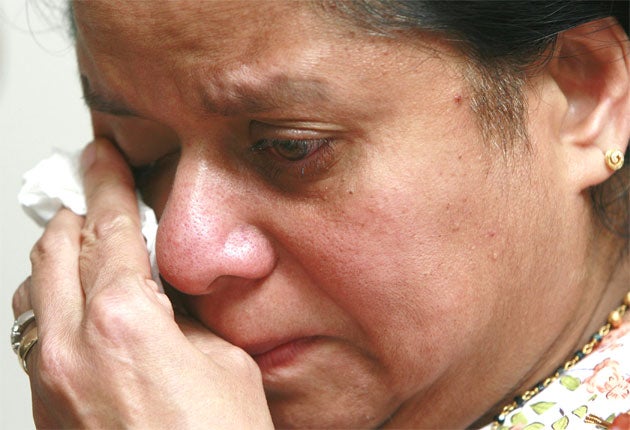Wife's fears for general imprisoned in Sri Lanka
Anoma Fonseka tells Andrew Buncombe she has been kept in the dark about the whereabouts of the defeated candidate

Your support helps us to tell the story
From reproductive rights to climate change to Big Tech, The Independent is on the ground when the story is developing. Whether it's investigating the financials of Elon Musk's pro-Trump PAC or producing our latest documentary, 'The A Word', which shines a light on the American women fighting for reproductive rights, we know how important it is to parse out the facts from the messaging.
At such a critical moment in US history, we need reporters on the ground. Your donation allows us to keep sending journalists to speak to both sides of the story.
The Independent is trusted by Americans across the entire political spectrum. And unlike many other quality news outlets, we choose not to lock Americans out of our reporting and analysis with paywalls. We believe quality journalism should be available to everyone, paid for by those who can afford it.
Your support makes all the difference.Supporters of the seized Sri Lankan opposition leader Sarath Fonseka have vowed to take to the streets of Colombo today to protest against his arrest and detention at an undisclosed location.
General Fonseka's wife, Anoma, broke down in tears as she revealed how the authorities had still not informed her where her husband was being held, after military police bundled him away on Monday evening. She said she feared for his safety and called on the international community to work to free him.
Speaking by phone from Colombo, she said: "They have not told me where he is. I have tried to find out but could not. There are a lot of rumours: some say he is being held at the naval headquarters, some say he is at the army headquarters. Some say he is at an army camp. I cannot find out; nobody can go there."
Last night – just 24 hours after the general was arrested while meeting political allies at his offices – came the announcement that President Mahinda Rajapaksa had dissolved parliament and called elections for 8 April. General Fonseka's supporters believe the decision to arrest him was a purely political move, designed to get him out of the way ahead of the parliamentary elections in which he has vowed to participate.
The general had stood side-by-side with the President in May after defeating the Tamil Tigers, but fell out later over what he said was false accusations of planning a coup and a promotion he complained had sidelined him by stripping his powers.
The government says now that General Fonseka, who failed to beat Mr Rajapaksa in the presidential election last month, is being investigated for participating in political activity while he was in uniform – an alleged breach of the military code. It added he was "hellbent" on betraying his comrades, by allegedly agreeing to testify in a war crimes inquiry.
Government minister Keheliya Rambukwella told reporters General Fonseka would be tried in a military court on charges of conspiring against the President. "When he was the army commander and chief of defence staff and member of the security council, he had direct contact with opposition political parties, which under the military law can amount to conspiracy," he said. "He's been plotting against the President while in the military... with the idea of overthrowing the government."
Mano Ganesan, a member of the coalition that supported General Fonseka in the presidential contest, said it was anticipated that more political leaders would be arrested.
Opposition parties and their supporters were planning to gather outside the country's Supreme Court this morning for a non-violent demonstration against General Fonseka's arrest. "We are prepared to face this with determination," Mr Ganesan said.
Following his election victory, the President spoke of the need for reconciliation and urged the country to pull together. Yet in the absence of any hard evidence being produced against General Fonseka to show, as was claimed, that he had been plotting to launch a coup, many will see his arrest and detention as a further example of the government's readiness to silence its political critics.
Following the election a number of news websites that had been critical of the government were shut down for what the authorities claimed were "defamatory remarks".
The government has also overseen a major purging of the senior ranks of the army, with a number of senior officers who may have been close to General Fonseka being transferred or else forced to resign.
Suren Surendiran, a senior member of the British Tamils Forum, said: "The Rajapaksa regime has time and again proved to the international community that it doesn't believe in freedom of speech. If a war-winning Sinhala general gets this treatment by the regime, what chances have the Tamils got in that oppressive state?"
Join our commenting forum
Join thought-provoking conversations, follow other Independent readers and see their replies
Comments